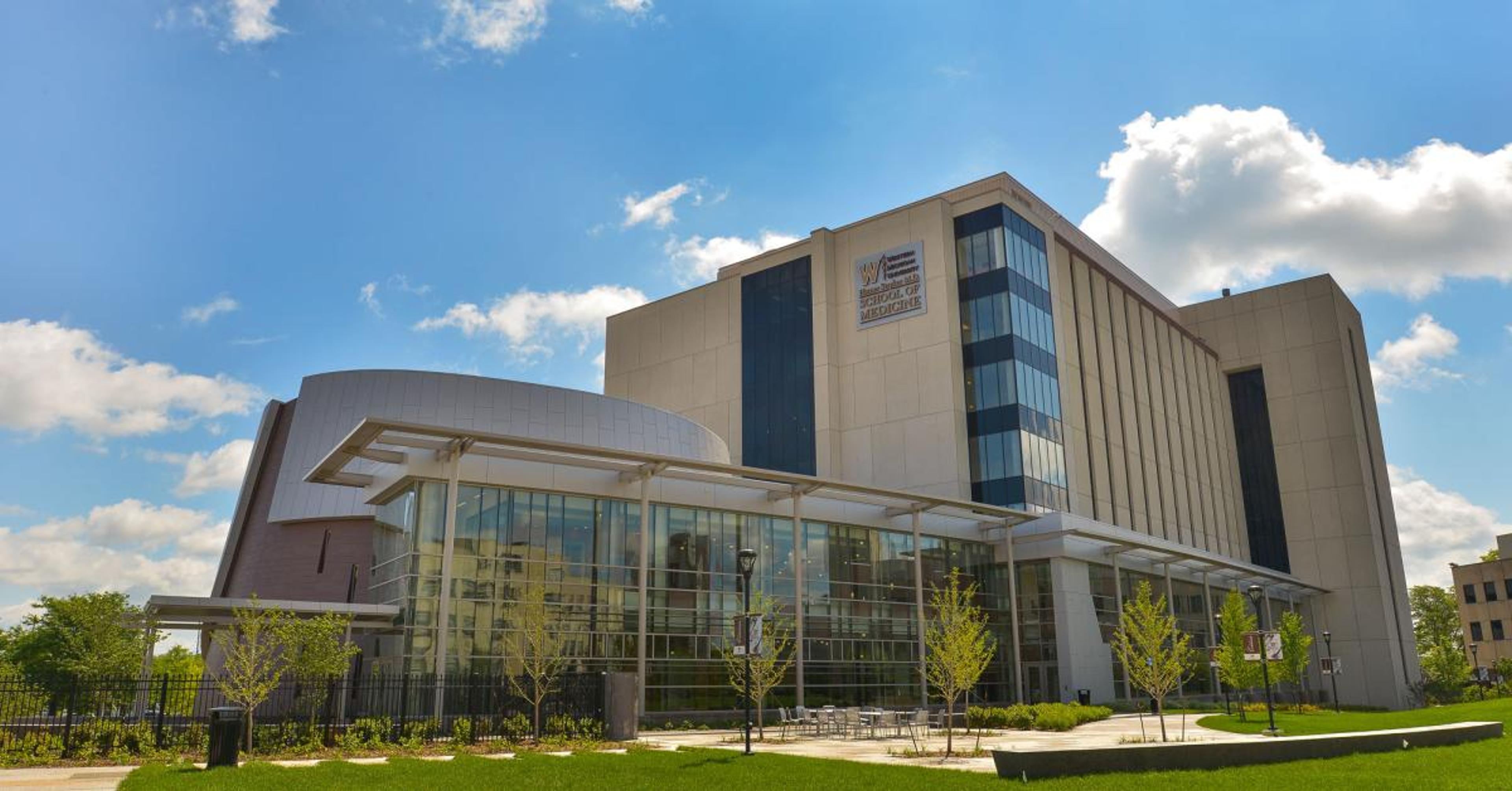The 7 Best Medical Schools in Michigan (2025)
Compare all 7 medical schools in Michigan for 2025—see GPA, MCAT, tuition, match rates, and which program best fits your career goals.
Posted November 5, 2025

Join a free event
Learn from top coaches and industry experts in live, interactive sessions you can join for free.
Table of Contents
There are seven medical schools in Michigan, six allopathic (MD) and one osteopathic (DO). These include nationally ranked institutions like the University of Michigan Medical School and community-focused programs such as Central Michigan University College of Medicine. Medical schools in Michigan are known for their strong research programs, emphasis on service to underserved populations, and a preference for in-state applicants.
From major urban centers like Detroit and Grand Rapids to smaller cities like Mount Pleasant and Kalamazoo, Michigan offers a wide range of training environments. Applicants should compare factors like curriculum style, class size, and average GPA and MCAT requirements to find the right school for their profile.
What Is Medical School?
Medical school is a four-year graduate program that prepares students to become licensed physicians. Medical students engage with unique curriculum structures and clinical training opportunities designed to enhance their learning experiences and professional development. There are two types of degrees: MD (Doctor of Medicine) and DO (Doctor of Osteopathic Medicine). Both types of programs include pre-clinical education in the sciences and clinical training through rotations in hospitals and clinics.
To apply, students need a bachelor’s degree, MCAT scores, and a completed primary application. The process is competitive, especially at Michigan medical schools, where in-state applicants have a higher acceptance rate.
Medical Schools in Michigan—Overview
Michigan is home to seven accredited medical schools—six MD-granting institutions and one DO-granting college. The University of Michigan Medical School, a prominent michigan school, is known for its unique offerings, historical significance, innovative curriculum, and substantial research funding. These programs share a commitment to training physicians who will serve local communities, especially in primary care and family medicine.
Key characteristics of Michigan medical schools:
- Strong preference for in-state applicants
- Early clinical training in diverse healthcare settings
- Community-based clinical education models
- Emphasis on family medicine, public health, and care for underserved populations
- Access to large academic health systems and urban hospitals
Several schools, such as the University of Michigan and Wayne State, are nationally recognized for research. Others, like CMU and MSUCOM, focus on producing physicians who practice in-state.
Components of Medical School in Michigan
Pre-Clinical Education
The initial phase of medical education in Michigan focuses on foundational sciences. For instance, the University of Michigan Medical School offers a one-year preclinical curriculum that integrates basic sciences with clinical skills from the outset. Similarly, Central Michigan University College of Medicine employs an integrated, systems-based approach, presenting disciplines like genetics, anatomy, and biochemistry in a cohesive manner aligned with patient presentations.
Early Clinical Exposure
Early hands-on experience is a hallmark of Michigan's medical programs. Michigan State University's College of Human Medicine, through its Shared Discovery Curriculum, immerses students in clinical settings early on, emphasizing experiential learning and mentorship. Wayne State University School of Medicine integrates clinical experiences with basic sciences from day one, fostering a deep understanding of health needs and social determinants.
Clinical Rotations (Clerkship Phase)
The latter years are dedicated to clinical rotations across various specialties. Oakland University William Beaumont School of Medicine, for example, offers rotations in internal medicine, pediatrics, surgery, and more, utilizing its affiliation with William Beaumont Health System to provide diverse clinical experiences. Michigan State University's College of Osteopathic Medicine assigns students to base hospitals for clerkships in family medicine, internal medicine, obstetrics and gynecology, general surgery, psychiatry, and other fields.
Research and Dual Degree Options
Opportunities for research and pursuing dual degrees are available. The University of Michigan Medical School, for instance, offers a dynamic curriculum with dedicated time for students to explore their research interests, which can include research endeavors. Michigan State University’s College of Osteopathic Medicine provides dual-degree programs like the DO-PhD Physician Scientist Training Program, preparing graduates for careers in medical research and academia.
Service to Underserved Populations
Commitment to serving underserved communities is evident. Spartan Street Medicine, part of Michigan State University College of Osteopathic Medicine's community service initiatives, highlights the school's dedication to providing medical care to underserved populations while offering students valuable hands-on clinical experiences. Michigan State University’s College of Human Medicine emphasizes community-based medicine, aligning with its mission to improve health in diverse populations. Wayne State University School of Medicine, located in Detroit, offers students unique opportunities to engage with urban populations, addressing health disparities firsthand.
Factors to Consider When Choosing a Medical School in Michigan
- School Mission and Curriculum Focus: Align your personal goals with the institution’s mission. For example, if you’re interested in community-based medicine, Michigan State University’s College of Human Medicine emphasizes this approach.
- In-State Advantage: Public institutions like Michigan State University’s College of Human Medicine show a preference for in-state applicants, with acceptance rates significantly higher for residents.
- Tuition and Financial Aid: Assess the cost of attendance and available financial aid. Public schools often offer lower tuition for residents, while private institutions may have different financial structures.
- Learning Environment: Consider class sizes and teaching methodologies. For instance, Wayne State University School of Medicine emphasizes an organ systems-based curriculum where students engage actively in their medical education through various hands-on experiences and collaborative learning environments, integrating clinical experiences from the start.
- Location and Clinical Sites: Evaluate the geographic setting and affiliated hospitals. Urban campuses like Wayne State provide exposure to diverse patient populations in Detroit, while others may offer experiences in suburban or rural settings.
- Residency Match Rates: Research each school’s match rates and the specialties graduates pursue to gauge the institution’s success in placing students in desired residencies.
Lists Medical Schools in Michigan
| School Name | Location(s) | Degree | Public/Private | Avg GPA | Avg MCAT | Acceptance Rate | Tuition (IS/OOS) |
|---|---|---|---|---|---|---|---|
| University of Michigan Medical School | Ann Arbor | MD | Public | 3.84 | 515 | 1.8% | $59,840 / $79,694 |
| Wayne State University School of Medicine | Detroit | MD | Public | 3.74–3.80 | 509–514 | 3.5% | $45,949 / $72,972 |
| MSU College of Human Medicine (CHM) | East Lansing, Grand Rapids + 5 others | MD | Public | 3.70 | ~507 | 2.5% | $34,300 / $61,054 |
| Central Michigan University College of Medicine | Mount Pleasant, Saginaw | MD | Public | 3.70 | 508 | 1.4% | $46,325 / $67,430 |
| Oakland University William Beaumont (OUWB) | Rochester | MD | Public | 3.87 | 510 | 1.8% | $59,242 (flat) |
| Western Michigan University Homer Stryker (WMed) | Kalamazoo | MD | Private | 3.70 | 514 | 2.4% | $68,300 (flat) |
| MSU College of Osteopathic Medicine (MSUCOM) | East Lansing, Detroit, Clinton Township | DO | Public | 3.70 | 507 | 4.2% | $59,580 / $91,850 |
1. University of Michigan Medical School
- Total Class Size (Class of 2024): 171 students
- Applications Received: 9,338
- Interviews Granted: 444
- Acceptance Rate: 1.8%
- Median GPA: 3.84
- Median MCAT: 515
- In-State Residency: 43.5%
- Tuition: $59,840 (in-state), $79,694 (out-of-state)
- Founded: 1850
- Location: Ann Arbor, Michigan
- Interview Format: Traditional panel interviews
Visit the University of Michigan Medical School Facts & Figures
Key Focus Areas:
- Early clinical skills training through a longitudinal Doctoring Course
- “M-Home” learning communities for student advising and support
- Strong funding and infrastructure for research and innovation
- Dual-degree opportunities including MD/PhD through the Medical Scientist Training Program (104 students enrolled)
- Emphasis on leadership, health equity, and academic medicine
Diversity Snapshot (Class of 2024):
- 59% identify as female
- 39% identify as male
- 4% identify as agender/genderqueer/gender non-conforming, transgender, or questioning
- Students from 31 states and 73 undergraduate institutions
- 43.5% Michigan residents
Research & Clinical Stats:
- $729M in sponsored research expenditures
- $483M in NIH funding (FY2023)
- 1,885 active clinical trials
- Over 4,000 faculty members affiliated with Michigan Medicine
The University of Michigan Medical School is one of the most selective and research-intensive medical programs in the country. Students benefit from early clinical exposure, a flexible and personalized curriculum, and access to world-class faculty and research infrastructure. The school’s “M-Home” model supports wellness, mentorship, and community-building, while its doctoral course ensures longitudinal development in patient care and communication. With a track record of matching students into competitive specialties and prestigious residency programs, Michigan continues to be a top destination for applicants pursuing careers in academic medicine, clinical leadership, and research.
2. Wayne State University School of Medicine
- Total Class Size (Class of 2028): 318 students
- Applications Received (2024 cycle): 9,159
- In-State: 1,584
- Out-of-State & International: 7,575
- Acceptance Rate: 3.5%
- Median GPA: ~3.74–3.80 (based on prior reporting)
- Median MCAT: ~509–514 (based on prior reporting)
- In-State Residency: 54%
- Tuition: $45,949 (in-state), $72,972 (out-of-state)
- Location: Detroit, Michigan
- Interview Format: Traditional panel interviews
Visit Wayne State School of Medicine Facts and Figures
Key Focus Areas:
- The only medical school located in the city of Detroit
- Highest number of Michigan-based practicing physicians among all state schools
- Hands-on clinical education from the first year
- Multiple dual-degree pathways including MD/MPH, MD/MBA, and MD/PhD
- Three-year MD track available for select students
- Focus on primary care, urban health, and community engagement
Diversity Snapshot (Class of 2028):
- 100+ undergraduate institutions represented
- Over 120 different majors
- 27 students are first-generation college graduates
- Top 5 undergrad majors: Biology, Neuroscience, Biochemistry, Biomedical Sciences, Psychology
Research & Clinical Stats:
- Ranked #2 in medical research in Michigan (U.S. News & World Report, 2023)
- Over 24,000 community service hours completed annually by M1 and M2 students
- Integrated urban clinical training model with access to major Detroit hospitals
- 2024 Match Day:
- Match Rate: 98.1%
- 48% matched in Michigan
- 33% matched into primary care
- 257 total matched students across 30 states and 24 specialties
Wayne State University School of Medicine is known for its service-focused mission and large class size. Students train in one of the nation’s most medically underserved urban environments, gaining early clinical experience alongside faculty committed to community health. With a robust residency match rate, dual-degree offerings, and a wide range of clinical and research opportunities, Wayne State prepares students to serve patients in both primary care and specialized fields across Michigan and beyond.
3. Michigan State University College of Human Medicine (CHM)
- Total Class Size (Class of 2024): 190 students
- Applications Received: 7,582
- Acceptance Rate: 2.5%
- Median GPA: ~3.70 (recommended target for competitiveness)
- Median MCAT: ~507 (recommended target score for competitiveness)
- In-State Residency: 86%
- Tuition: $34,300 (in-state), $61,054 (out-of-state)
- Location(s): East Lansing (pre-clinical) + 7 regional community campuses statewide
- Interview Format: Likely Multiple Mini Interview (MMI) or structured panel (not publicly confirmed)
Visit MSU CHM 2024 Entering Class
Key Focus Areas:
- Patient-centered education through the Shared Discovery Curriculum, where students learn clinical skills early and continuously
- Training physicians to serve underserved and rural communities across Michigan
- Clinical education at eight community campuses, including Flint, Grand Rapids, Traverse City, Midland, and the Upper Peninsula
- Strong emphasis on health equity, public health, and primary care
- Holistic admissions process with no GPA or MCAT cutoffs, though academic standards align with national averages
Diversity Snapshot (Class of 2024):
- 61.5% female, 38% male, 0.5% another gender identity
- 86% Michigan residents
- 24% from rural communities
- 49% from low-income, disadvantaged, or first-generation college backgrounds
- 11% from groups underrepresented in medicine
- 17% entered via pipeline programs like ABLE and Early Assurance
Community Campus Network:
- Flint
- Grand Rapids
- Lansing
- Midland
- Southeast Michigan
- Traverse City
- Upper Peninsula Region
Students complete their clinical years at one of these campuses in collaboration with local hospitals and healthcare providers. This distributed model allows for smaller learning environments, strong mentorship, and exposure to a range of populations and healthcare systems.
Academic and Nonacademic Assessment:
- GPA/MCAT: Competitive applicants generally have a GPA of 3.5+ and an MCAT of 500+
- No cutoffs, but lower scores may require upward trends or additional postbacc coursework
- Holistic review heavily weighs nonacademic factors like:
- Volunteer experience (clinical and non-clinical)
- Leadership
- Physician shadowing
- Experience with diverse populations
- Research or service learning
Special Programs:
- ABLE (Advanced Baccalaureate Learning Experience): A conditional acceptance program for disadvantaged applicants showing promise but lacking science prerequisites
- MD/MPH and other public health integration through MSU’s College of Human Medicine and College of Public Health
Michigan State University College of Human Medicine is known for its mission-driven admissions process and statewide training model. Students are selected based on both academic ability and demonstrated commitment to serving underserved communities. The curriculum provides early patient contact and consistent clinical integration, giving students experience with real-world medicine from the start. With strong residency placements in family medicine, internal medicine, and public health, CHM is a strong choice for applicants interested in primary care and community health careers.
4. Central Michigan University College of Medicine (CMU COM)
- Total Class Size (Class of 2024): 104 students
- Applications Received: 7,529
- Interviews Conducted: 477
- Acceptance Rate: 1.4%
- Median GPA: Not officially published; recent class averages around 3.70
- Median MCAT: ~508 (based on reported averages in previous years)
- In-State Residency: 82 Michigan residents (79%)
- Tuition: $46,325 (in-state), $67,430 (out-of-state)
- Campus Locations: Mount Pleasant (pre-clinical), Saginaw (Clinical)
- Interview Format: Traditional (MMI not used)
Visit CMU College of Medicine Class Profile
Key Focus Areas:
- Strong emphasis on primary care and service to underserved and rural populations in Michigan
- Longitudinal Comprehensive Community Clerkship (CCC) in year 3 offers deep clinical immersion in real-world community health settings
- Clinical training across regional affiliate hospitals and CMU Medical Education Partners in the Great Lakes Bay Region
- Focus on simulation-based learning using advanced virtual reality, high-fidelity manikins, robotic surgery tools, and standardized patient labs
- MD/MBA dual-degree option available for students interested in health systems leadership
Diversity Snapshot (Class of 2024):
- 68 female, 36 male
- Average age: 24 (range: 20–40)
- 10% from groups underrepresented in medicine
- 13 students hold advanced degrees
- Students from 41 undergraduate institutions; 13 located in Michigan
Top Feeder Schools:
- University of Michigan (24)
- Michigan State University (17)
- Wayne State University (8)
- Central Michigan University (6)
- Grand Valley State University (3)
Clinical & Research Highlights:
- Students complete clinical training at major affiliate hospitals in Saginaw, including Covenant HealthCare and Ascension St. Mary’s
- Residency programs in Emergency Medicine, Internal Medicine, Family Medicine, Psychiatry, Surgery, and OB/GYN
- 100% residency match rate for the Class of 2025
- Ongoing research in public health, translational medicine, and rural healthcare access
CMU College of Medicine was founded with a mission to train physicians who will address healthcare shortages in underserved and rural Michigan communities. With a curriculum that blends early clinical exposure, simulation labs, and long-term mentorship during community clerkships, the program prepares students to practice patient-centered care in real-world environments. The school favors applicants with strong service backgrounds, especially those committed to staying in-state post-residency.
5. Oakland University William Beaumont School of Medicine (OUWB)
- Total Class Size (Class of 2028): 129 students
- Applications Received: 7,044
- Interviews Conducted: 517
- Acceptance Rate: 1.8%
- Median GPA: 3.87
- Median Science GPA: 3.82
- Median MCAT: 510
- In-State Residency: 56% Michigan residentsTuition: $59,242 (in-state and out-of-state)
- Campus Locations: Rochester, MI (Oakland University); Clinical rotations at Corewell Health hospitals in Royal Oak, Troy, and Grosse Pointe
- Interview Format: MMI
Visit OUWB Class of 2028 Class Profile
Key Focus Areas:
- Integrated four-year Embark curriculum for student research and scholarly projects
- Early clinical exposure and service learning
- Strong partnership with Corewell Health (formerly Beaumont Health) for clerkship and residency training
- Emphasis on community engagement, service, and leadership
- Diversity, equity, and inclusion programs embedded across all levels
Diversity Snapshot (Class of 2028):
- 63% female, 36% male, 1% other
- 13% first-generation college students
- 31% socioeconomically disadvantaged
- Students speak 25 different languages
- Students from 43 undergraduate institutions and 18 U.S. states
- 10 countries represented
Top Undergraduate Majors:
- Biology
- Health Sciences
- Biochemistry
- Biomedical Science
- Neurology
- Molecular Biology
- Non-STEM disciplines also represented
Clinical & Research Highlights:
- Students complete clinical clerkships at Corewell Health’s Royal Oak, Troy, and Grosse Pointe campuses
- Access to 44 accredited GME programs across Corewell Health
- Early exposure to underserved populations through student-run clinics and community outreach
- Active student groups supporting outreach, wellness, specialty interest, and research
- Over 108,000 hours of community service completed by the incoming class
OUWB offers a personalized and supportive medical education with a balance of clinical rigor and compassionate care. With strong affiliations to Corewell Health and a mission grounded in humanism, community service, and lifelong learning, OUWB attracts students who want to serve diverse patient populations while contributing to medical innovation and equity.

6. Western Michigan University Homer Stryker M.D. School of Medicine (WMed)
- Total Class Size (Class of 2024): 84 students
- Applications Received: 3,558Campus Interviews: 446
- Acceptance Rate: 2.4%
- Average GPA: 3.7
- Average MCAT: 514
- MCAT Range: 498–522
- Tuition: $68,300 (approx., in-state and out-of-state; private institution)
- Location: Kalamazoo, Michigan
- Interview Format: Traditional interviews (in-person or virtual)
Visit WMed Class of 2024 Profile
Key Focus Areas:
- Simulation-heavy curriculum with 90+ hours of hands-on training in year one
- Required Medical First Responder (MFR) training with national certification
- Strong emphasis on community service and clinical readiness
- Interdisciplinary collaboration with Ascension Borgess and Bronson Methodist Hospital
- NIH-funded research in immunobiology, neuroinflammation, and health disparities
- Full SSH accreditation for simulation center (reaccredited 2023)
Diversity Snapshot (Class of 2024):
- 51% Female, 49% Male
- 19% Underrepresented in Medicine
- Average Age: 24.9 (Range: 21–38)
- 100% had health-related experience
- 89% had research experience
- 57,779+ community service hours logged
Top Undergraduate Majors:
- Biology
- Chemistry
- Neuroscience
- Psychology
- Public Health
- Spanish
- English
- Political Science
- Education
- Philosophy
- Economics
Undergraduate Institutions Represented:
48 institutions, including:
- University of Michigan (10)
- Western Michigan University (4)
- UC Los Angeles (6)
- UC Berkeley (4)
- UC Irvine (4)
- Wayne State University (3)
- Michigan State University (3)
- University of Notre Dame (3)
- Johns Hopkins University, Dartmouth, McGill, and many more
Geographic Diversity:
- Students from 18 U.S. states
- Private school with a national applicant pool
- Includes both Michigan and out-of-state representation
WMed is known for its immersive and hands-on approach from day one. Through rigorous training that includes simulation, emergency response, and clinical rotations, students are prepared not only for exams but for real-world medical challenges. With extensive community engagement and cutting-edge NIH-funded research, WMed offers a well-rounded education in a collaborative, tight-knit environment.
7. Michigan State University College of Osteopathic Medicine (MSUCOM)
- Total Class Size (Entering Class 2024): Approximately 300 students
- Applications Received: 7,117
- Acceptance Rate: 4.2%
- Average GPA: 3.7
- Average MCAT: 514
- MCAT Range: 498–522
- In-State Residency: 67% Michigan residents
- Tuition: ~$59,580 (in-state); ~$91,850 (out-of-state, based on MSU graduate tuition estimates)
- Clinical Rotations: 22 partner hospitals across Michigan via Statewide Campus System (SCS)
- Interview Format: Traditional interview
Visit the MSUCOM Facts and Figures
Key Focus Areas:
- One of the largest osteopathic medical schools in the U.S. with strong ties to community-based primary care
- Early clinical exposure and emphasis on osteopathic principles
- Largest single provider of pediatric care to underserved populations in Lansing
- International and underserved community health opportunities available through faculty-led programs
- High match success and strong in-state retention of graduates
Diversity Snapshot (Entering Class 2024):
- 13% underrepresented in medicine
- 48% of persons of color
- 13% first-generation college students
- 15% non-traditional students
- Students from across the U.S. and globally
MSUCOM combines the strengths of a major research university with a mission-driven focus on primary care and underserved populations. Students benefit from statewide clinical training, global health electives, and top-tier osteopathic research opportunities, making it a leading choice for those pursuing a D.O. degree with a community impact.
Expert Tips for Choosing the Right Medical School in Michigan
1. Cross-Reference Mission Statements with Your AMCAS Activities Section
Each Michigan medical school—whether allopathic or osteopathic—has a unique mission and community focus. For example, OUWB emphasizes humanism and community service, while MSUCOM leans into primary care and underserved populations. Before applying, audit your AMCAS experiences (especially the "Most Meaningful" ones) and see how well they align with a school's mission. If you're applying to Wayne State, and your activities don’t touch on urban health or social justice, consider how to bridge that gap—or whether it’s the right fit at all.
2. Use Clinical Rotation Locations to Predict Career Trajectory
Beyond the curriculum, your clinical sites determine residency competitiveness. For example, Michigan State's DO program places students in community hospitals, while UMMS students rotate through top-tier academic medical centers like Michigan Medicine. If you're aiming for a competitive specialty (e.g., dermatology, plastic surgery), look for schools with affiliated teaching hospitals or quaternary care centers, as those sites often host the strongest residency programs and offer networking with research-active faculty.
3. Check Each School’s Recent Match List—Then Work Backwards
Go beyond “match rate” percentages. Instead, look at where students are matching and into which specialties. For instance, if WMed sends grads consistently to university-based programs in neurology or OB-GYN, and that’s your goal, it signals strong departmental support and advising. Search "[School Name] Match List site:edu" or contact admissions to request match outcome data. Then, reverse-engineer your personal goals to see which programs are more likely to help you land the residency you want.
4. Use the AAMC MSAR to Compare Median Debt Loads by School
It’s not just about tuition—it’s about the cost of living, hidden fees, and financial aid culture. The AAMC’s MSAR database includes median debt upon graduation, which can reveal surprising disparities.For instance, even with similar tuition rates, students at UMMS may graduate with lower debt than those at private schools like OUWB due to better institutional scholarships. Use this to forecast your actual cost, not just sticker price.
5. Map School-Specific Research Strengths to Your Long-Term Career Vision
If you’re planning an academic career, your med school should offer mentored research that builds your CV by M3. For example; MSUCOM has the highest NIH funding among osteopathic schools—great for D.O. students seeking academic pathways. WMed offers structured research through its Center for Immunobiology and new NIH grants. UMMS is ideal for those targeting academic medicine or physician-scientist tracks with its extensive HHMI ties and dual-degree programs.
The Bottom Line
Michigan offers a rich, mission-driven landscape for medical education, with options for every type of applicant—from those pursuing research-intensive careers to those dedicated to primary care and service in underserved communities. Whether you're drawn to the academic prestige of the University of Michigan, the urban clinical immersion of Wayne State, the distributed campus model of MSU CHM, or the tight-knit, service-focused environments of WMed, CMU, OUWB, and MSUCOM, each school brings unique strengths. The key is aligning your application with each institution’s mission, evaluating where their graduates match, and understanding how the curriculum and clinical partnerships will shape your future as a physician. With high match rates, a strong emphasis on community engagement, and a preference for in-state applicants, Michigan is an especially strategic choice for residents looking to build lasting medical careers close to home.
Get Help From a Medical School Coach
Working with an expert coach can improve your chances of getting accepted. Leland’s med school admissions coaches can help you build your school list, edit secondary essays, and prepare for interviews.
Related Articles
- Medical School Application Timeline: The Ultimate Guide
- A Guide to the T20 Medical Schools in the U.S.
- Medical School Application Timeline: The Ultimate Guide
- The Ultimate Guide to the Medical School Application Process
FAQs
How many medical schools are in Michigan?
- Michigan is home to seven accredited medical schools, including MD and DO programs. These include top institutions like the University of Michigan, MSU’s two colleges (CHM and COM), Wayne State, OUWB, CMU, and WMed.
What’s the easiest medical school to get into in Michigan?
- While all are competitive, schools like Central Michigan and MSU College of Osteopathic Medicine are known for holistic admissions and a mission-driven focus on primary care and underserved communities. Strong community service and a good personal story can go a long way.
What GPA do you need to get in?
- Most accepted students have a GPA between 3.5 and 3.9. UMMS averages around 3.88, OUWB 3.87, and WMed about 3.7. MSU’s programs may be more flexible if other parts of your application stand out.
Which Michigan med school is best?
- The University of Michigan ranks highest for research and prestige. But “best” depends on your goals—MSU and CMU excel in primary care, OUWB and WMed offer a tight-knit experience, and MSUCOM is a leader in osteopathic medicine.
Browse hundreds of expert coaches
Leland coaches have helped thousands of people achieve their goals. A dedicated mentor can make all the difference.




















